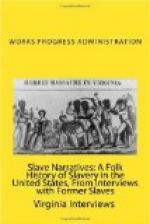“I’se seen many a patrol in my lifetime, but dey dassent come on us place. Now de Kloo Kluxes[FN: Ku Kluxes] was diff’ent. I rid[FN: rode] wid’ em many a time. ’Twas de only way in dem days to keep order.
“When I was ’bout twenty-two year old, I married Clara Breaden. I had two chilluns by her, Diana an’ Davis. My secon’ wife’s name was Annie Bet Woods. I had six chillun by her: Mary, Ella, John D., Claud William, an’ Prince, Jr. Three boys an’ two gals is still livin’. I lives wid my daughter, Claud, what is farmin’ a place ’bout five miles from Clarksdale. I has’ bout fifteen head o’ gran’chillun an’ ever’ las’ one of ’em’s farmers.
“Things is all peaceful now, but de worl’ was sho’ stirred up when Abraham Lincoln was ’lected. I ’member well when dey killed ’im. Us had a song’ bout ’im dat went lak dis:
’Jefferson Davis rode de milk white
steed,
Lincoln rode de mule.
Jeff Davis was a mighty fine man,
An’ Lincoln was a fool.’
“One o’ de little gals was a-singin’ dat song one day an’ she mixed dem names up. She had it dat Marse Davis was de fool. I’se laughed ’bout dat many a time. When Mistis finished wid’ er she had sho’ broke her from suckin’ eggs.
“I knows all ’bout what slave uprisin’s is, but never in my life has I seen anything lak dat. Never! Never! Where I was brought up de white man knowed his place an’ de Nigger knowed his’n[FN: his]. Both of’ em stayed in dey place. We aint never had no lynchin’s, neither.
“I know all ‘bout Booker T. Washington. He come to de state o’ Mississippi once an’ hel’ a meetin’ in Jackson. He made a gran’ talk. He made mention ‘bout puttin’ money in de bank. Lots o’ darkies made ‘membrance o’ dat an’ done it. He tol’ us de firs’ thing us had to learn was to work an’ dat all de schoolin’ in de worl’ wouldn’ mean nothin’ if us didn’ have no mother wit[FN: energy & common sense]. It’s a pity us aint got more folks lak him to guide us now dat us aint got no marster an’ mistis to learn us.
“I’s a Nigger what has been prosperous. I made a-plenty cotton an’ I teached my chillun to be good blue stockin’ Presbyterians. All ‘roun’ de country I was knowed an’ ever’body b’lieved in me.
“Maybe things is better lak dey is today. Mos’ folks says so anyway. But if Old Marster were a-livin’ I’d be better off. I know dat to be so.
“I can hear ’im say to me new, ’Prince Albert, who is you named for? Well den hol’ yo’ head high so folks can see you is quality.’”
Mississippi Federal Writers Slave Autobiographies
[HAMP KENNEDY Mahned, Mississippi]
Uncle Hamp Kennedy, a farmer, 78 years old, weighs about 135 pounds, and is about 5 feet 9 inches high. His head is bald with a little gray fuzz over his ears and growing low toward the nape of his neck. He does not wear spectacles nor smoke a pipe. His face is clean shaven.




